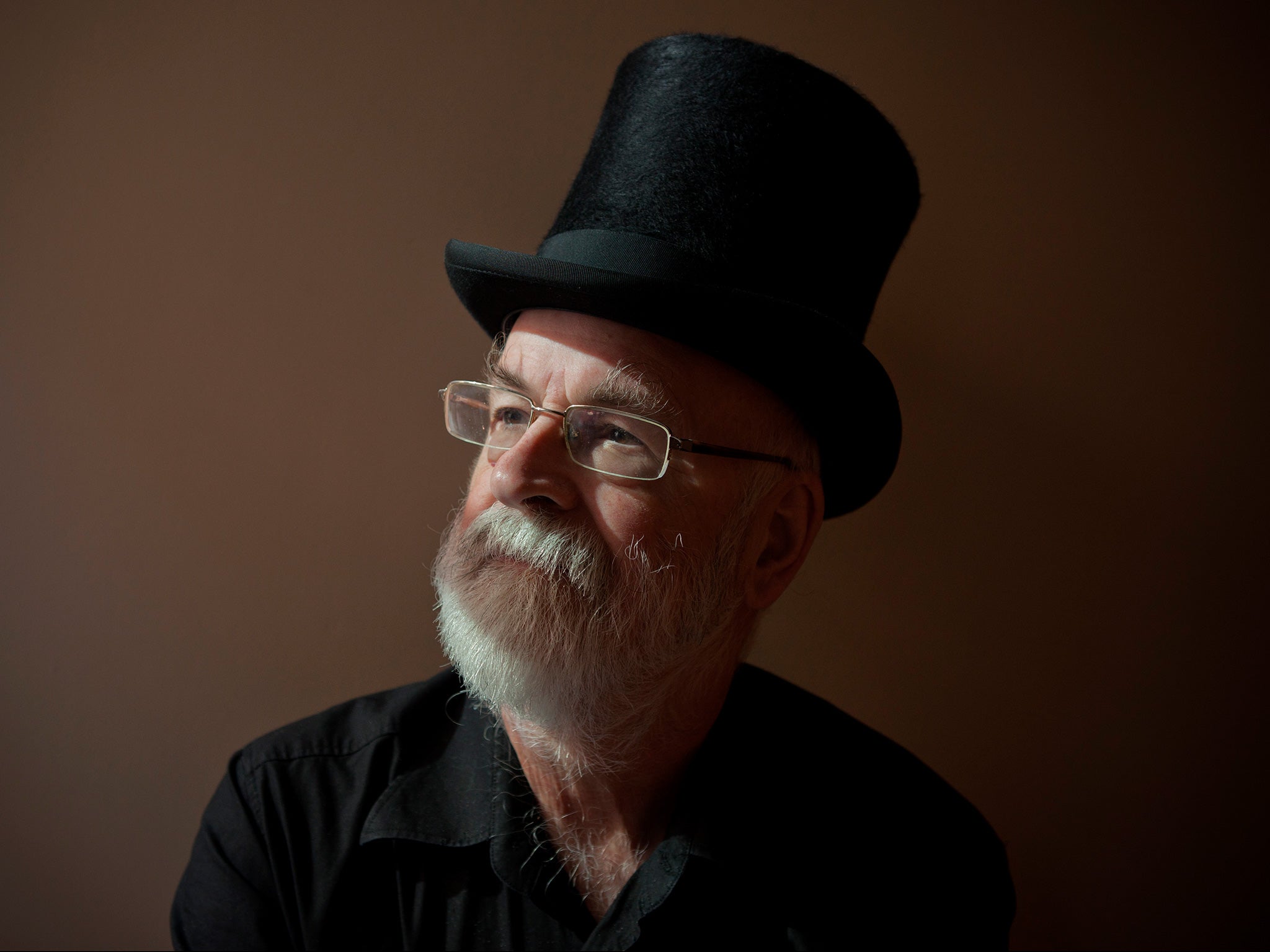Terry Pratchett meets Death: Indomitable and inimitable to the end – the light fantastic goes out
Arifa Akbar mourns the passing of a unique literary talent

Your support helps us to tell the story
From reproductive rights to climate change to Big Tech, The Independent is on the ground when the story is developing. Whether it's investigating the financials of Elon Musk's pro-Trump PAC or producing our latest documentary, 'The A Word', which shines a light on the American women fighting for reproductive rights, we know how important it is to parse out the facts from the messaging.
At such a critical moment in US history, we need reporters on the ground. Your donation allows us to keep sending journalists to speak to both sides of the story.
The Independent is trusted by Americans across the entire political spectrum. And unlike many other quality news outlets, we choose not to lock Americans out of our reporting and analysis with paywalls. We believe quality journalism should be available to everyone, paid for by those who can afford it.
Your support makes all the difference.Discworld fans are in mourning. Their literary wizard, Sir Terry Pratchett, local journalist turned internationally bestselling novelist of more than 70 books, died today aged 66.
Shortly after 3pm, his official Twitter feed (run in conjunction with his friend and assistant, Rob Wilkins) sent a desolate yet typically unfussy message to fans: “The End”. The message before that made the point more lyrically: “Terry took Death’s arm and followed him through the doors and on to the black desert under the endless night.”
Larry Finlay, the managing director of his publishers, Transworld, said: “Terry passed away in his home, with his cat sleeping on his bed surrounded by his family.”
When Pratchett revealed to the world that he had Alzheimer’s, he did so in stalwart fashion, talking about the need to be cheerful, and about his own necessity to carry on working as long as he could.
He had worked as a journalist on the Bucks Free Press, in Buckinghamshire, long enough to know how to write on the go, in all conditions.
Wilkins, his assistant of 14 years, became indispensable to him after his diagnosis, doing much of the day-to-day computer work for him. Yet he kept on writing the books, doing the book tours. A quote from his 1990 black comedy Good Omens encapsulated his attitude: “‘Don’t think of it as dying,’ said Death. ‘Just think of it as leaving early to avoid the rush’.”
I met him in 2012, by which time he had lived with Alzheimer’s for five years. As someone who lives at close quarters to dementia – my father has suffered from the illness for the past 13 years – I am well-acquainted with the signs. In our conversation, Pratchett was warm, engaging, mischievous and loquacious, only occasionally lapsing into pauses that were a just slightly too long, and stumbling occasional mid-sentence, so that I couldn’t be certain he would carry on.

But he did carry on, and it was one of my most memorable and enjoyable interviews. He told me stories about his childhood love of science fiction – how he would have to sneak into a local porn shop in High Wycombe because it was only place that sold fantasy books in the late 1950s and early 60s.
He said – tantalisingly – that he had an unfinished memoir – half-written then because he kept getting distracted by his fictive universes. He subsequently published A Slip of the Keyboard, a book of collected non-fiction, though I half suspect this may not be the memoir he was referring to. I will not be the only one who waits on tenterhooks to see if further work will be published posthumously.
Most importantly, he told me that he was well up for the fight against his “embuggerance” at a time when my own struggles with dementia – witnessing its slow, savage progress in the case of my father – were fraught and depressing. I told him about my father, and it was inspiring to hear his intransigence, his incorrigible bolshiness. He clearly wasn’t anywhere near giving in, despite the tremor in his handshake. “What keeps me going is the fight,” he said. “My mum was always up for a fight. The fight keeps you alive, fills you up with fire.”
Asked how he felt about receiving an OBE but never a major fiction prize, he said he didn’t give a fig about being overlooked by the high literary establishment. He struck me as a quirky outsider, at peace with being on the outside.
Not that he was unloved. His popularity, which sometimes verged into fanatical fan-worship, knew no bounds. He was knighted for services to literature in 2009. His books have so far sold 85 million worldwide. In April 2009, two roads in a Somerset town took names from his Discworld series. He was so popular that he was reputed to be the author that British shoplifters most liked to pilfer from bookshops – a fact he shared with me with a hoot of laughter.
We over-ran the hour allotted for our chat. “Maybe we’ll talk again,” he said, referring to the novels he hoped to publish in future. He seemed to be writing voraciously, as if fending off the worst through sheer force of creative spirit.
The “embuggerance” may have got him in the end, but it clearly didn’t claim the energy, the intelligence, and the sheer zest for life that was Pratchett’s along the way.
Join our commenting forum
Join thought-provoking conversations, follow other Independent readers and see their replies
Comments